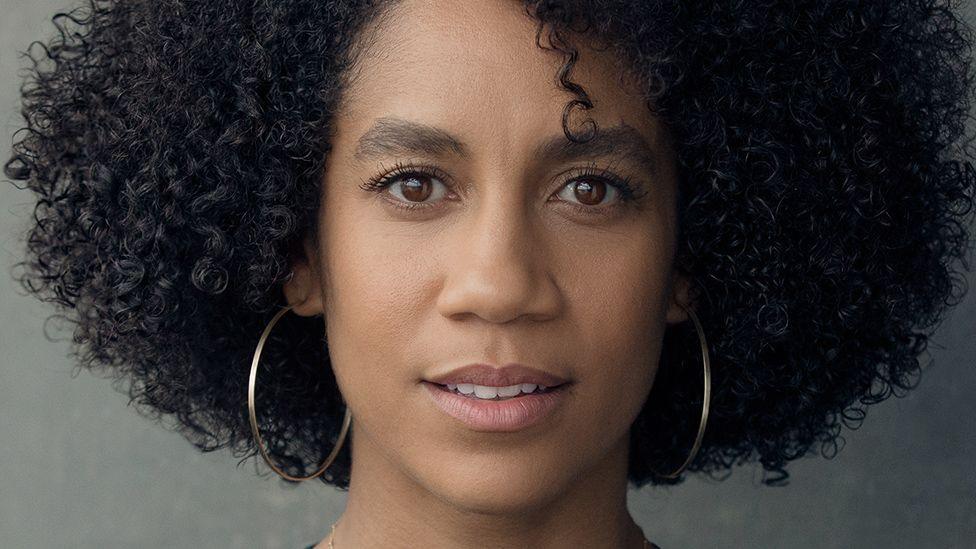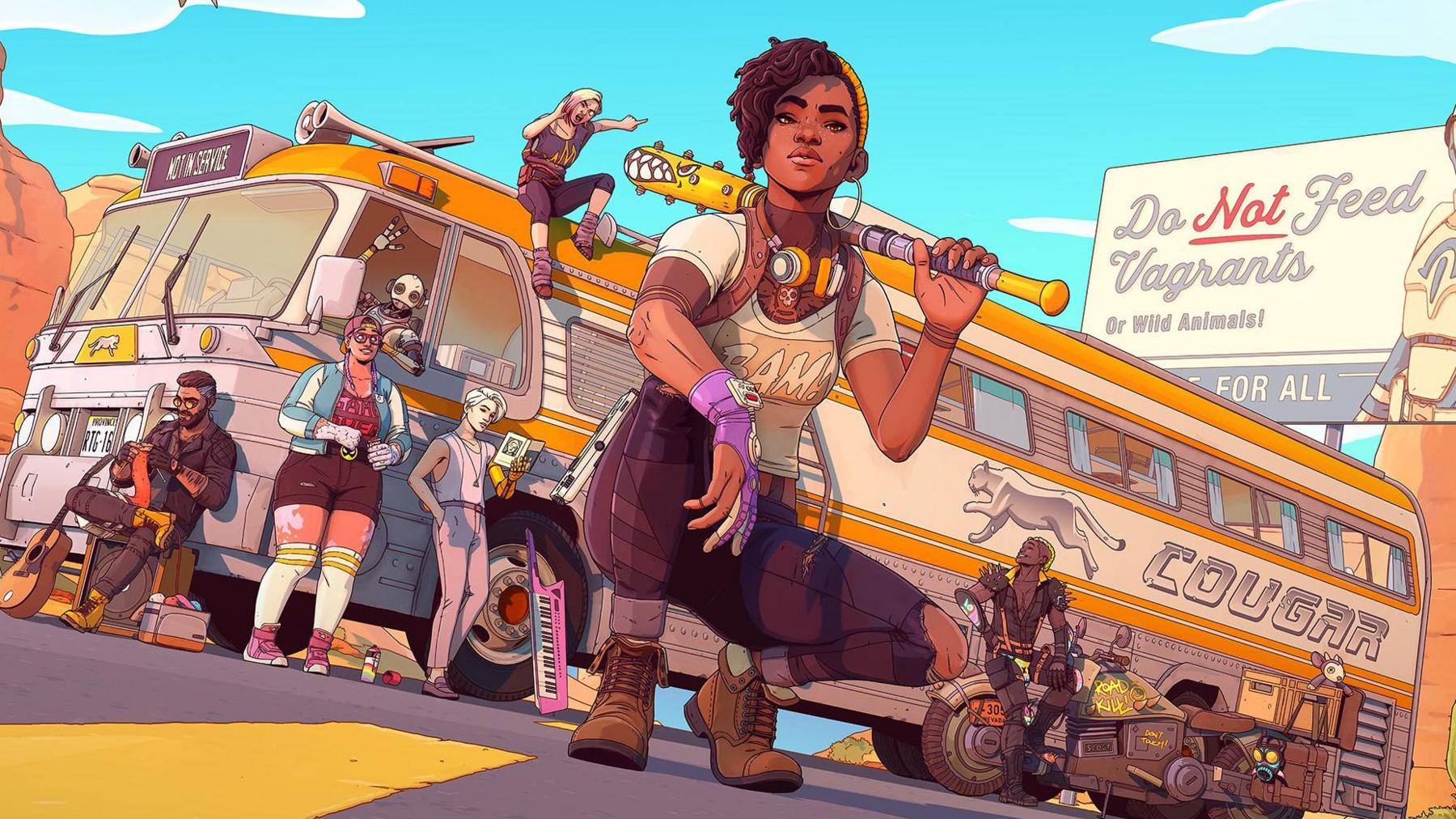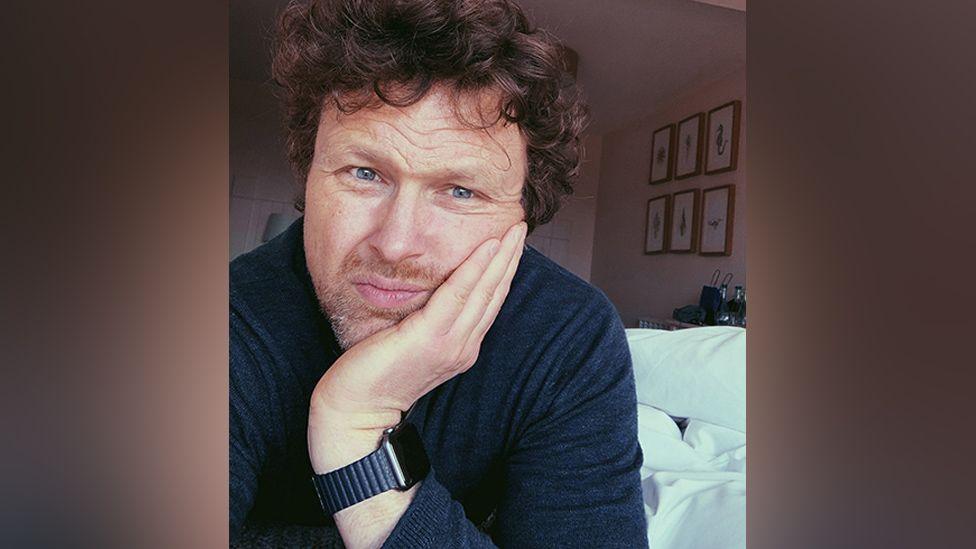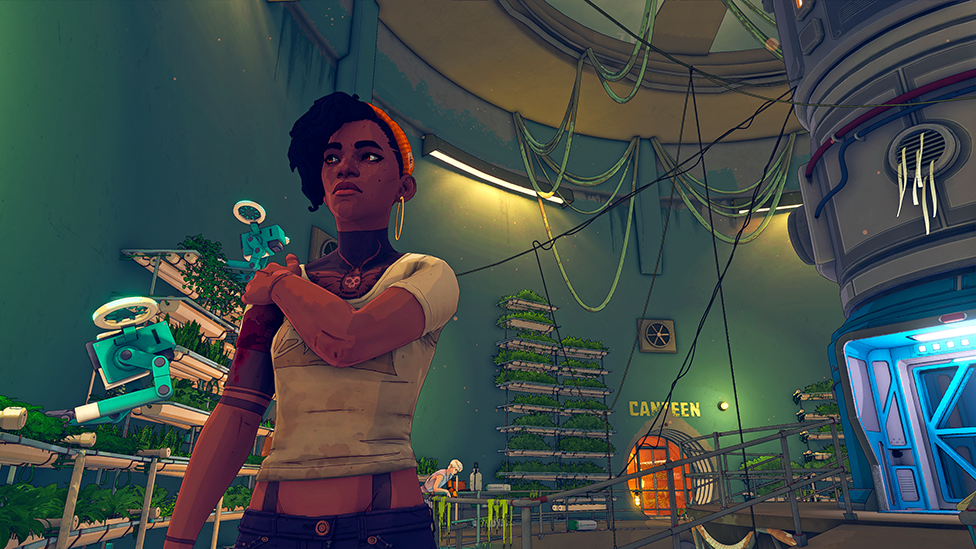'No-one forced us to make a game with a diverse cast'

Dominique Tipper's best known for her work on The Expanse
- Published
A videogame set in a divided America starring a cast of diverse characters was always likely to ruffle feathers.
But Dominique Tipper likes a challenge.
The actress is best known for her work on The Expanse, a hit sci-fi show that ran for six seasons.
More recently she's been in New York, performing in a production of Grenfell: A Survivor's Story.
Her next project is Dustborn, that comic-book inspired videogame that takes place in a dystopian USA run by an authoritarian force known as Justice.
Dominique voices Pax, the leader of a group of "anomals" - people able to weaponise words via superpower-style abilities.
Tasked with transporting a stolen package and posing as a punk band, the heroes head off on a road trip across North America, fleeing Justice and the owners of the parcel.
Dominique describes the group as Pax's "found family" and says "as the game goes on, you kind of develop relationships with them".
"I think she's also on a quest to kind of create a better life for herself, and also figure out a bit more about who she is," says Dominique.
"She's quite a fabulous, flawed character."

Dustborn is heavily inspired by comics, as shown by its art style
Previews of Dustborn have praised its cartoon-style visuals and gameplay that mashes up several different genres.
Characters are at the heart of the game, and its diverse main cast has drawn a fair amount of attention.
It includes Pax's lover Noam, who uses gender-neutral pronouns, Sai, a Muslim, and Pax's younger sister Ziggy, who deals with anxiety and hyperactivity.
When it was first revealed, Dustborn was hit with some negative feedback from those who believe developers are being pressured into making their games more diverse.
Ragnar Tørnquist, creative director at developer Red Thread Games, insists that isn't the case.
"I think publishers and developers are just understanding more that there's a wider and more diverse audience out there," he says.
"Games are becoming more global, games are becoming more accessible to everyone.
"And that means the audience changes."
Ragnar says he understands why people might push back, "especially if you're the kind of player who's used to seeing yourself on the screen."
But he says there's room for games that feature casts, stories and perspectives we're less used to seeing.
"We're just making one game that will hopefully find an audience.
"Maybe it's a different audience, and I think we can afford to be different," he says.

Developer Ragnar Tørnquist says there's room for new perspectives in gaming
Dominique says she's not a fan of "buzzwords and buzz sentences" linked to representation but that there is some truth behind them.
"I think there's nothing quite like seeing yourself on screen or in a game, if you've never ever seen it before," she says.
Dominique says she was drawn to Dustborn because the characters were "multi-layered", and Ragnar says the developers wanted to "create a cast that just feels like a representation of the world as it is today".
He admits that his team, based in Norway, is mostly made up of people that look like him.
So, Ragnar says, they "tapped into the cast" and found writers "who are more representative of the characters in the game".
"We think it's more interesting, it's the right thing to do," he says.
"And I think the stories that come out of it are also more original, more interesting."

Dustborn is a mix of exploration, branching dialogues and rhythm action sections
From her experience working across different industries, Dominique feels there are deep-rooted issues fuelling backlashes that won't be solved overnight.
"I think we can continue to make art that combats that," she says.
"Because it can change people's attitudes on a social level.
"And I think that then can filter into changing things on a systemic level."
In Britain, games industry body UKIE says that minority groups are under-represented in more senior roles, external, and the proportion of women working in the sector is under the national average.
Ragnar says he'd like to see more support for developers from under-represented backgrounds "in order to really see a change in the stories games can tell".
"I think if you embrace it, both from the development side and from the player side, that can be groundbreaking," he says.
"I think we're just at the start of letting games expand boundaries, be they cultural or political or social. Just being able to see the world from different perspectives."
Ragnar accepts that Dustborn might not be a hit with everyone who plays it.
"I mean, that's fine. It's just having an emotional response. That's what I really care about, whether that's positive or critical," he says.
"It's fine as long as it's an emotional response, as long as this game had an impact and meant something to people."
Can indie games inspire a creative boom from Indian developers?
- Published14 June 2024
Could House of the Dragon star change the face of gaming?
- Published23 April 2024
Gaming festival shines a light on diversity
- Published10 April 2024
Dominique, on the other hand, says she doesn't engage with negativity when it does crop up.
"I won't really stand for it, to be honest," she says.
"I'm from the East End.
"Like, if you all want to hit me up and do some of that nonsense, go ahead and try.
"I'm not the one."
